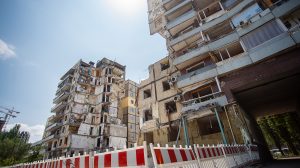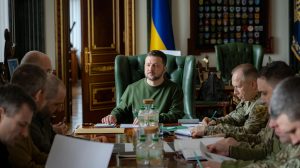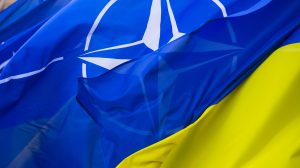You can read all of our coverage of Russia’s invasion of Ukraine, including explainers and articles offering context and background information here.
Russia’s invasion of Ukraine
An agreement allowing Ukraine to export millions of tonnes of grain through the Black Sea despite the ongoing conflict with Russia has been extended.
The two-month extension, negotiated by the United Nations and Turkey, was announced on Wednesday – a day before the previous deal was due to expire. There had been concerns that Russia could pull out of the pact.
It was first agreed last July following fears of global food shortages as a result of the war in Ukraine. The agreement has been renewed several times since then, despite Russia’s criticism of Western sanctions against its agricultural sector.
Ukraine is one of the world’s top producers of grain, but its access to ports in the Black Sea was initially blocked by Russian warships following the invasion in February last year.
Turkish President Recep Tayyip Erdogan said : “With the efforts of our country, the support of our Russian friends, the contribution of our Ukrainian friends, it was decided to extend the Black Sea grain deal for two more months.”
More than 30 million tonnes of grain have left Ukraine under the deal – mostly going to the world’s poorest countries.
On Thursday, Russia launched what Ukraine said were “unprecedented” air attacks that targeted Kyiv and other regions.
Ukraine said its air defence forces had shot down 29 out of 30 Russian cruise missiles fired overnight.
“The Russian occupiers launched several waves of missile attacks from different directions. A total of 30 sea, air and land-based cruise missiles were launched,” the military said, adding that Ukrainian air defence systems had “destroyed 29 cruise missiles”.
Earlier in the week, on Tuesday Ukrainian air defences, bolstered by sophisticated Western-supplied systems, thwarted an intense Russian air attack on Kyiv, shooting down all missiles aimed at the capital.
The bombardment, which targeted locations across Ukraine, included six Russian Kinzhal aero-ballistic hypersonic missiles, the most fired in a single attack in the war so far, according to Ukrainian air force spokesman Yurii Ihnat.
Russian President Vladimir Putin has repeatedly touted the Kinzhals as providing a key strategic competitive advantage and among the most advanced weapons in his country’s arsenal. The missiles are difficult to detect and intercept because of their hypersonic speed and manoeuvrability.
Ukrainian authorities detained the country’s supreme court chief justice on Tuesday for allegedly having taken bribes from an oligarch, as Kyiv steps up its anti-corruption efforts while at war with Russia.
Vsevolod Kniaziev was accused of receiving a bribe worth 2.7 million US dollars, according to Ukrainian anti-graft prosecutors who said that the money was a “reward” for a ruling made “in favour of the owner of the Finance and Credit group”.
That group is controlled by mining tycoon Kostyantyn Zhevago. The high-profile case marks the latest in a series of probes targeting the country’s oligarchs, as Ukrainian officials have vowed to further crack down on corruption, a condition for continued western financial and military support, as well as integration into the EU and NATO military alliance.

Other news from the region
An end to decades of conflict between Armenia and Azerbaijan could be in sight, European Council President Charles Michel said Sunday following negotiations between the two sides. Speaking at a press conference in Brussels after hosting a trilateral meeting with Azerbaijani President Ilham Aliyev and Armenian Prime Minister Nikol Pashinyan, Michel said the two leaders shared a common willingness for a South Caucasus at peace. “Following the recent positive talks held in the US on the peace treaty, the momentum should be maintained to take decisive steps towards the signing of a comprehensive peace agreement,” Michel added.
Georgian Airways will resume direct flights to Russia from Saturday, the country’s civil aviation authority said this week, drawing criticism from Ukraine and the European Union. The move comes after Moscow lifted a flight ban last week in a significant warming of ties with Georgia, with which it has had no formal diplomatic relations since Russia defeated its southern neighbour in a short war in 2008. The EU said it regretted that Georgia was resuming flights to Russia at a time when the bloc has closed its airspace to Russian planes in response to Moscow’s invasion of Ukraine.
Belarusian authorities this week released photographs and video of Alexander Lukashenko, attempting to put an end to a week of speculation about the authoritarian leader’s health. The footage showed Lukashenko visiting an army control point, but the ruler’s heavily bandaged arm and hoarse, exhausted voice appeared to confirm rumours that he has been in poor health. Lukashenko had not been seen in public since last Tuesday, when he attended a military parade in Moscow. Rumours circulated that he had been admitted to hospital on his return to Minsk.
Bulgarian chief prosecutor Ivan Geshev has refused to step down, tearing up his resignation letter on national television. “I will finish my mandate,” the 52-year-old Geshev told reporters on Monday. “I am not afraid.” Geshev’s actions came amid rising pressure for him to resign following allegations by opponents that an explosion near his car earlier this month described as an assassination attempt was staged. Prosecutors from the Supreme Judicial Council subsequently launched dismissal procedures against Geshev for “damaging the image of the justice system” by disseminating allegedly false information and meddling with the investigation into the May 1 blast near his vehicle.
Authorities in Serbia on Sunday displayed stacks of guns and cartons of hand grenades from the thousands of weapons, including anti-tank rocket launchers, that they said people handed over since back-to-back mass shootings stunned the Balkan nation. The government declared a one-month amnesty period for citizens to surrender unregistered weapons as part of a crackdown on guns following the two shootings in two days this month that left 17 people dead, many of them children.
The Estonian prime minister said she had to “plead” with local companies to find a “moral compass” and decline deals that may result in Moscow accessing sanctioned goods. Kaja Kallas said in an interview with the Financial Times this week that Russia’s lucrative trade circumventing western sanctions was attracting companies in the Baltic states despite the countries’ hawkish stance on the Ukraine war. Her comments come after the Financial Times identified one billion US dollars worth of such goods having disproportionately passed through the Baltic states, believed to be part of Moscow’s “ghost trade”.
Slovakian MPs are under mounting international pressure to reject a bill that would see the country follow Hungary in effectively putting a stop to decades of legal gender recognition for transgender people. A vote is expected in parliament within days on a law proposed by conservative and far-right parties that would require someone to have the “correct” set of chromosomes to match their legal gender. Human rights NGO Amnesty International has joined the Council of Europe in appealing to Slovakian MPs not to back the bill, which they say is in conflict with the country’s obligations under the European convention on human rights.
Prosecutors in Kazakhstan say that they have recouped up to 760 billion tenge (1.7 billion US dollars) in illegally appropriated assets in a revenue-generating exercise that was initiated in the wake of political unrest that ripped through the country in January 2022. The General Prosecutor’s Office said on May 12 that around 575 million US dollars out of that overall sum was returned to Kazakhstan from abroad. Success in clawing back this money will be branded as a triumph by supporters of President Kassym-Jomart Tokayev, who has pledged to dismantle the crony system that flourished under his predecessor and mentor, Nursultan Nazarbayev.
Photo: Volodymyr Zelensky official Facebook page.
Unlike many news and information platforms, Emerging Europe is free to read, and always will be. There is no paywall here. We are independent, not affiliated with nor representing any political party or business organisation. We want the very best for emerging Europe, nothing more, nothing less. Your support will help us continue to spread the word about this amazing region.
You can contribute here. Thank you.







Add Comment